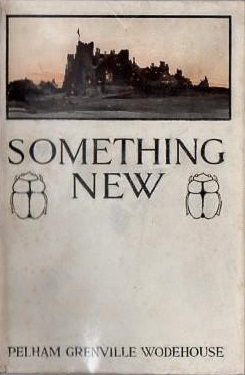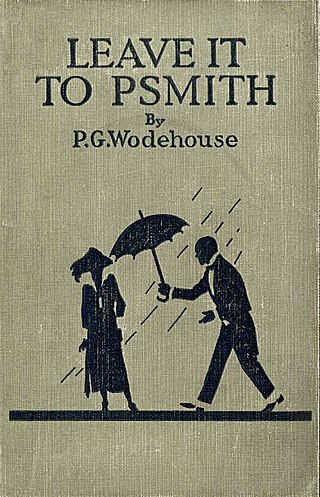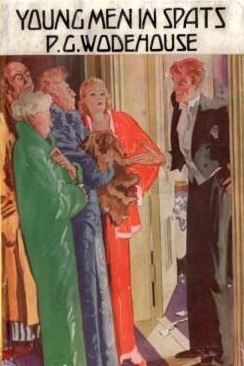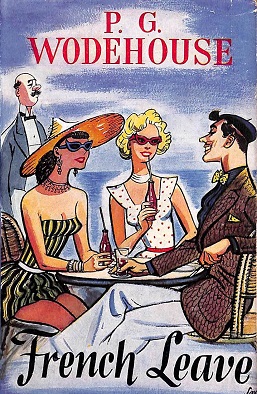
Ring for Jeeves is a novel by P. G. Wodehouse, first published in the United Kingdom on 22 April 1953 by Herbert Jenkins, London and in the United States on 15 April 1954 by Simon & Schuster, New York, under the title The Return of Jeeves.

Something Fresh is a novel by P. G. Wodehouse, first published as Something New in the United States, by D. Appleton & Company on 3 September 1915. It was published in the United Kingdom as "Something Fresh" by Methuen & Co. on 16 September 1915. There are a number of differences between the American and British versions, but essentially, it is the same book. The novel introduces Lord Emsworth of Blandings Castle, whose home and family reappear in many of Wodehouse's later short stories and novels.

Plum Pie is a collection of nine short stories by P. G. Wodehouse, first published in the United Kingdom on 22 September 1966 by Barrie & Jenkins, and in the United States on 1 December 1967 by Simon & Schuster, Inc., New York. The collection's title is derived from P. G. Wodehouse's nickname, Plum.

Leave It to Psmith is a comic novel by English author P. G. Wodehouse, first published in the United Kingdom on 30 November 1923 by Herbert Jenkins, London, England, and in the United States on 14 March 1924 by George H. Doran, New York. It had previously been serialised, in the Saturday Evening Post in the US between 3 February and 24 March 1923, and in the Grand Magazine in the UK between April and December that year; the ending of this magazine version was rewritten for the book form.

A Few Quick Ones is a collection of ten short stories by P. G. Wodehouse. It was first published in the United States on 13 April 1959 by Simon & Schuster, New York, and in the United Kingdom on 26 June 1959 by Herbert Jenkins, London. The first US edition dust jacket was designed by Paul Bacon. The book's title comes from the informal phrase "a quick one", which is British slang for an alcoholic drink consumed quickly.

Eggs, Beans and Crumpets is a collection of short stories by P. G. Wodehouse, first published in the United Kingdom on April 26, 1940 by Herbert Jenkins, London, then with a slightly different content in the United States on May 10, 1940 by Doubleday, Doran, New York.

Piccadilly Jim is a novel by P. G. Wodehouse, first published in the United States on 24 February 1917 by Dodd, Mead and Company, New York, and in the United Kingdom in May 1918 by Herbert Jenkins, London. The story had previously appeared in the US in the Saturday Evening Post between 16 September and 11 November 1916.

The Small Bachelor is a novel by P. G. Wodehouse, first published in the United Kingdom on 28 April 1927 by Methuen & Co., London, and in the United States on 17 June 1927 by George H. Doran, New York.

Young Men in Spats is a collection of short stories by P. G. Wodehouse, first published in the United Kingdom on 3 April 1936 by Herbert Jenkins, London, then in the United States with a slightly different selection of stories on 24 July 1936 by Doubleday, Doran, New York.

Uncle Fred in the Springtime is a novel by P. G. Wodehouse, first published in the United States on 18 August 1939 by Doubleday, Doran, New York, and in the United Kingdom on 25 August 1939 by Herbert Jenkins, London.

Full Moon is a novel by P. G. Wodehouse, first published in the United States by Doubleday & Company on 22 May 1947, and in the United Kingdom by Herbert Jenkins on 17 October 1947. It is the sixth full-length novel to be set at the beautiful but trouble-ridden Blandings Castle, home of Lord Emsworth.

"Ukridge's Accident Syndicate" is a short story by P. G. Wodehouse, which first appeared in the United States in the May 1923 issue of Cosmopolitan, and in the United Kingdom in The Strand Magazine in June 1923, under the title "Ukridge, Teddy Weeks and the Tomato". It features the irrepressible Stanley Featherstonehaugh Ukridge, and was included in the collection Ukridge, published in 1924.

Pigs Have Wings is a novel by P. G. Wodehouse, which first appeared as a serial in Collier's Weekly between 16 August and 20 September 1952. It was first published as a book in the United States on 16 October 1952 by Doubleday & Company, New York, and in the United Kingdom on 31 October 1952 by Herbert Jenkins, London. It is the seventh novel set at Blandings Castle.

French Leave is a novel by P. G. Wodehouse, first published in the United Kingdom on 20 January 1956 by Herbert Jenkins, London and in the United States on 28 September 1959 by Simon & Schuster, Inc., New York.

"The Custody of the Pumpkin" is a short story by British comic writer P. G. Wodehouse. It first appeared in the United States in the 29 November 1924 issue of The Saturday Evening Post, and in the United Kingdom in the December 1924 issue of Strand Magazine. Part of the Blandings Castle canon, it features the absent-minded peer Lord Emsworth, and was included in the collection Blandings Castle and Elsewhere (1935), although the story takes place sometime between the events of Leave it to Psmith (1923) and Summer Lightning (1929).
"Lord Emsworth Acts for the Best" is a short story by P. G. Wodehouse, which first appeared in the United Kingdom in the June 1926 Strand Magazine, and in the United States in the 5 June 1926 issue of Liberty. Part of the Blandings Castle canon, it features the absent-minded peer Lord Emsworth, and was included in the collection Blandings Castle and Elsewhere (1935), although the story takes place sometime between the events of Leave it to Psmith (1923) and Summer Lightning (1929).
"Company for Gertrude" is a short story by P. G. Wodehouse, which first appeared in the United Kingdom in September 1928 in Strand, and in the United States in October 1928 in Cosmopolitan. Part of the Blandings Castle canon, it features the absent-minded peer Lord Emsworth, and was included in the collection Blandings Castle and Elsewhere (1935), though the story takes place sometime between the events of Leave it to Psmith (1923) and Summer Lightning (1929).
Come On, Jeeves is a comedic play co-written by Guy Bolton and P. G. Wodehouse. The play was written in the summer of 1952, and toured the English provinces in the summer of 1954. Wodehouse adapted the play into the novel Ring for Jeeves, which was first published in April 1953, a year before the play reached production. Come On, Jeeves is still occasionally produced and was presented as recently as December 2017.
"George and Alfred" is a short story by P. G. Wodehouse and a Mr. Mulliner story. It was published in Playboy magazine in the US in January 1967. The story was also included in the 1966 collection Plum Pie.

The Small Bachelor is a 1927 American silent comedy film directed by William A. Seiter and written by John B. Clymer, Rex Taylor and Walter Anthony. It is based on the 1927 novel The Small Bachelor by P. G. Wodehouse. The film stars Barbara Kent, George Beranger, and William Austin. The film was released on November 6, 1927, by Universal Pictures. Carl Laemmle was the film's presenter.
















